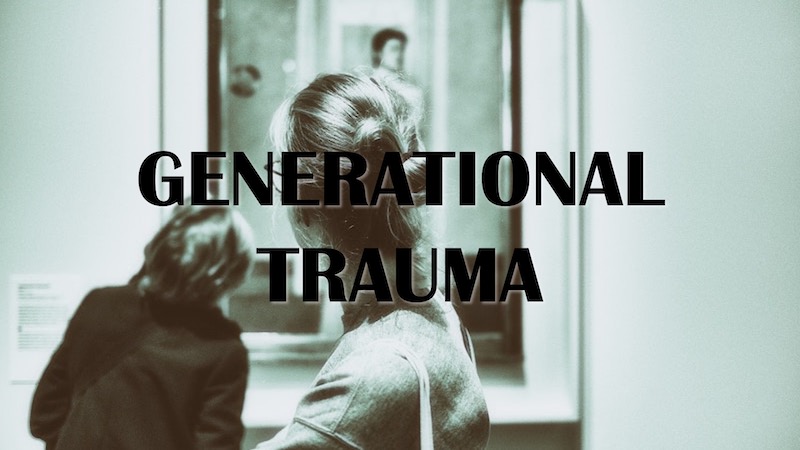7 Mistakes to avoid with generational trauma
- 28 July 2023
- Posted by: Michael H Hallett
- Category: Generational trauma ,

I’ve written a lot about what to do to recognise and release generational trauma. What I haven’t written is what not to do. So, here goes—7 mistakes to avoid with generational trauma.
1. Generational trauma doesn’t apply to me
This can be characterised by the phrase, “I don’t have any family trauma.”
The mistake here is to believe that trauma is something only others have.
If you live on this planet at this time, you will have some trauma. Humanity’s collective trauma occurred around 6,000 years ago in the Sahara, the Middle East, and Central Asia during a period of extended drought, desertification, and famine which caused traumatic changes in human psychology.
This precipitated the rise of a default, trauma-based patriarchal human psyche that spread through conquest over the following millennia to the four corners of the world.
As global human society is traumatised, its every member is traumatised.
2. Generational trauma doesn’t matter
This can be characterised by the phrase, “OK, I have some trauma, but it doesn’t affect me.”
The mistake here is to believe there are greater and lesser traumas, and the latter don’t really matter. Trauma is always malignant, even if its effects cannot be clearly identified.
This mistake arises from the normalisation of our collective trauma.
In The Politics of Experience, psychologist R.D. Laing writes: “What we call ‘normal’ is a product of repression, denial, splitting, projection, introjection, and other forms of destructive action on experience.”
Even if we’re not aware of that destructive action, it’s happening in the depths of our being.
Furthermore, trauma obeys the Law of Conservation of Energy. What cannot be transmuted must be transferred. Translation: if you don’t fix this, you will pass it on to your children.
3. It should be left alone
This can be characterised by the phrase, “Trauma should be left alone. Let sleeping dogs lie.”
This is a bad idea dressed up as a good idea—nobly maintaining the status quo and suffering in silence. The last thing humanity needs is maintenance of its patriarchal status quo.
This mistake is impelled by fear.
Psychoanalyst Wilhelm Reich writes: “Your conscious action is only a drop on the surface of a sea of unconscious processes, of which you can know nothing—about which, indeed, you are afraid to know.”
Fear of generational trauma is entirely legitimate. Yet that isn’t a good enough reason for inaction. Some of this fear, too, is the fear of not knowing what the trauma is.
4. It isn’t specific
This can be characterised by the phrase, “I have some trauma, but who knows what it is?”
Refer to Reich’s quote under the previous mistake—“a sea of unconscious processes.” Who knows what’s down there in the depths of our psyche?
In Debugging the Universe, Laura Knight-Jadczyk describes our unconscious as containing “unfathomable depths of the rejected, the unacknowledged, the unrecognised, the unknown and undeveloped elements of our existence.”
It’s not exactly Google Maps, is it?
Recognising generational trauma is a hero’s journey into the whitespaces of our emotional landscapes, liberally marked with ‘Here be dragons’. Yet, despite Laura’s comment, these depths can be fathomed with a structured approach like my Living With Ghosts course.
Once we accept the need to act, further potential mistakes arise.
5. It can be resolved by someone else
This can be characterised by the phrase, “I asked someone to wave a magic wand for me.”
I was genuinely told this once—“I asked someone in the church to say a prayer.”
It was obvious from subsequent communications this didn’t work well.
That someone was no doubt well-intentioned, but just as doubtlessly clueless about generational trauma. For all that we’d love magic wand solutions to life’s more intractable problems, they don’t work 999,999 times out of a million.
I’m aware of the science showing that prayer can have demonstrable effects. And I know that seemingly spontaneous trauma release can happen. Operative word: ‘seemingly’.
Trauma operates on a simple mechanical principle:
Trauma releases when the preconditions for its release are met
Even if someone walks into a church for the first time in their lives and experiences a spontaneous remission, you can be sure that the inner work necessary for the trauma to release has previously happened and the church is the final key that unlocks the puzzle.
Your trauma is yours alone and cannot be released without your active participation.
6. It can be easily resolved
This can be characterised by the phrase, “OK, I will knock it off my to-do list.”
This mistake stems from a mix of arrogance and ignorance. The two are natural bed fellows. Genuine knowledge and experience of resolving trauma always brings humility.
There’s an often-quoted phrase that life isn’t a destination, it’s a journey.
This certainly applies to resolving generational trauma. Unless you commit to fully showing up for every millisecond of the journey, you will miss the minute clues that unlock the path. And you will lack the commitment to face the pain, feel it, and transmute it.
Which brings us to the final mistake.
7. Generational trauma can’t be resolved
This can be characterised by the phrase, “I have some trauma, but it can’t be fixed.”
This is the last resort of those who really don’t want to deal with their trauma. This thing—whatever it is, which I don’t really want to know, can’t be fixed. Period. Get off my back.
All seven of these mistakes are versions of a single mistake—“I don’t want to take responsibility.”
Fear of responsibility arises from several factors: disturbing the status quo, not knowing what to do, fear of losing control, fear of an unknown outcome. There is no YouTube video out there that tells you what happens when you tackle a trauma specific to you.
Yet, as I describe in Living With Ghosts, there are principles that can be relied on. These principles are your allies and allow you to take responsibility for your trauma without knowing—yet—the who, what, where, when, and why of it.
The only real mistake with generational trauma is a failure of responsibility.
Next steps
For further resources on generational trauma, both free and paid, please click on this image.
Photo by krakenimages on Unsplash

